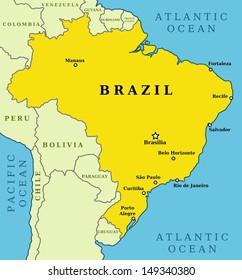Brazil has recently intensified its scrutiny of imported polyethylene through the implementation of stringent antidumping measures, signaling a significant shift in its trade policy framework. These protective actions aim to shield the domestic industry from surges of low-priced foreign polyethylene, but they are also poised to reverberate across the global markets. As one of the world’s leading consumers and producers of polyethylene, Brazil’s regulatory stance not only impacts international suppliers but also reshapes competitive dynamics within the Americas and beyond. This article explores the latest developments in Brazil’s antidumping policies, analyzing their potential consequences for global polyethylene trade flows, pricing structures, and the broader implications for manufacturers and consumers worldwide.
Brazil Tightens Antidumping Measures Targeting Polyethylene Imports
In a decisive move to protect its domestic polyethylene industry, Brazil has increased antidumping duties on imports, targeting several major exporters. Officials cited unfair pricing practices that have threatened local producers, leading to a more stringent regulatory framework. This adjustment is expected to impact import volumes and shift market dynamics in the South American region significantly. Stakeholders within the supply chain are closely monitoring these changes, as they could influence pricing, availability, and long-term trade relationships.
The revised measures include:
- Higher tariff rates on polyethylene from key exporting countries.
- Expanded scope covering new polyethylene grades and blends.
- Stricter compliance and enhanced customs scrutiny procedures.
| Exporting Country | Previous Duty | New Duty | Impact on Market |
|---|---|---|---|
| United States | 12% | 18% | Reduced import volumes |
| South Korea | 10% | 15% | Price increase expected |
| Germany | 8% | 14% | Market realignment probable |
Impact of Brazilian Policies on Global Polyethylene Supply and Pricing Dynamics
Brazil’s recent implementation of antidumping measures targeting polyethylene imports has introduced a significant shift in the global supply chain. By imposing tariffs on select exporters, Brazil aims to protect its domestic producers from cheaper foreign imports, primarily from Asia and the Middle East. This protectionist stance, while bolstering local manufacturing, has ripple effects on global availability. International suppliers have been forced to recalibrate their distribution strategies, leading to tighter supplies in other key markets such as North America and Europe. Consequently, regional price disparities have widened, fueling volatility and prompting buyers to reconsider long-term procurement contracts.
Several key dynamics have emerged from these policy changes:
- Reduced import volumes into Brazil have increased export competition elsewhere.
- Supply chain rerouting has led to increased transportation costs and delays.
- Regional pricing adjustments have sparked short-term inflationary pressure on raw material costs.
| Region | Pre-policy (USD/MT) | Post-policy (USD/MT) | Price Change (%) |
|---|---|---|---|
| Brazil | 1,200 | 1,350 | +12.5% |
| North America | 1,100 | 1,170 | +6.4% |
| Europe | 1,150 | 1,200 | +4.3% |
Strategic Recommendations for Exporters Navigating Brazil’s Regulatory Landscape
Exporters aiming to penetrate or sustain their footing in Brazil’s polyethylene market must adopt a multifaceted strategy that anticipates and mitigates the impacts of antidumping duties. Key approaches include performing exhaustive price benchmarking against Brazilian industry norms and tailoring product offerings to align with local supply chain expectations. Furthermore, engaging with Brazilian trade advisors can provide critical insights into the evolving regulatory environment, allowing exporters to pre-emptively address duty investigations or procedural changes.
In addition to compliance, developing robust partnerships with local distributors and leveraging trade facilitation services can streamline customs clearance and reduce delays. Exporters should also invest in comprehensive risk assessments focused on antidumping audits and possible retaliatory tariffs. The table below highlights key actions exporters should prioritize:
| Strategic Action | Purpose | Expected Outcome |
|---|---|---|
| Price Benchmarking | Align pricing with Brazilian market standards | Reduced dumping allegations |
| Local Partnerships | Facilitate market entry and distribution | Improved supply chain efficiency |
| Regulatory Monitoring | Stay ahead of legal and procedural updates | Timely compliance and risk mitigation |
| Risk Assessment | Identify tariff exposure and enforcement trends | Informed decision-making and strategic agility |
Final Thoughts
As Brazil continues to enforce and adjust its antidumping measures on polyethylene, global markets are closely monitoring the ripple effects. These trade policies not only aim to protect domestic producers but also have significant implications for pricing, supply chains, and international trade dynamics. Stakeholders across the polyethylene value chain-from manufacturers to exporters-will need to navigate this evolving landscape carefully. Moving forward, the developments in Brazil’s approach to antidumping could set important precedents for other emerging economies grappling with similar market challenges.




